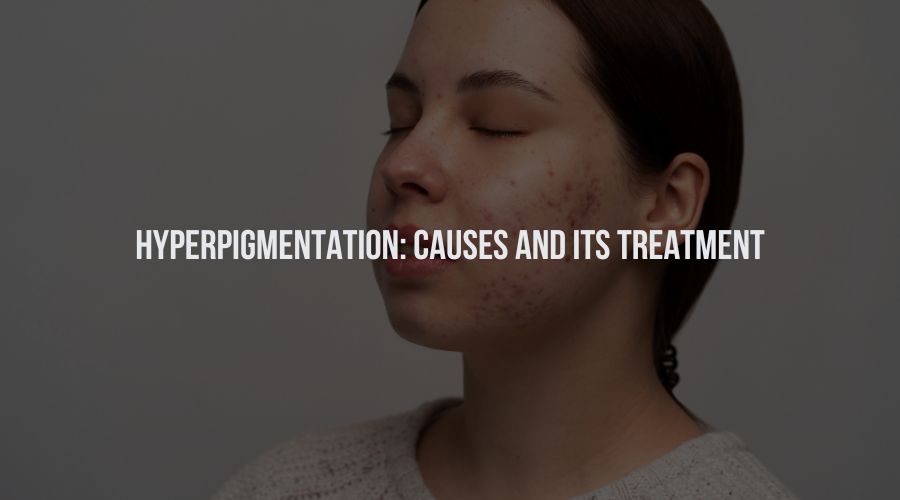Hyperpigmentation: Causes and Its Treatment

Hyperpigmentation is a very common skin concern that darkens a particular area more than others. Extra melanin causes dark patches of colours like brown, black, pink, and red. Hyperpigmentation doesn’t cause any discomfort like pain and itchiness, but it can make a person uncomfortable and self-conscious. Various lifestyle changes and treatments can help you to treat hyperpigmentation.
What is Hyperpigmentation?
Hyperpigmentation has become very normal these days. It doesn’t cause any pain, but it darkens some areas of your skin instead of the whole area. Where “Hyper” means more and ” Pigment” means colour.
It can appear brown, black, grey, and red patches and spots. The spots are sometimes called sun spots, dark spots, or liver spots.
Why does hyperpigmentation occur?
Skin cells produce a pigment called melanin, which gives skin its colour. These skin cells may create an excessive amount of melanin if they are diseased or injured. That area may seem darker due to melanin clumps.
Hyperpigmentation can result from numerous factors:
- Genetics, like a family with freckles.
- Hormone shifts, that occur during pregnancy or puberty.
- Skin damage (such as acne, wounds, or burns), also known as postinflammatory hyperpigmentation, can occur.
- Medications that cause light sensitivity, such as birth control pills and oral contraceptives.
- Melancholy.
- Inadequate intake of specific vitamins, like folic acid and B12.
- Sun damage (solar lentigines is a common term for these areas).
- Thyroid conditions.
What symptoms does hyperpigmentation cause?
Hyperpigmentation doesn’t have any symptoms other than dark areas. Seek advice from a dermatologist in Janakpuri or your primary care physician if you have skin spots along with any other symptoms.
How does one diagnose hyperpigmentation?
To identify hyperpigmentation, a dermatologist in Janakpuri Delhi could:
- Inquire about your medical history, the date the skin turned darker, and the medications you currently take.
- Examine your skin with a physical examination.
- Examine your skin with a Wood lamp, a type of special UV light.
- Get blood tests to evaluate thyroid function, iron, hormones, and vitamins.
- For a biopsy, which looks for any aberrant skin cells, take a tiny sample of skin.
How does one treat hyperpigmentation?
Based on the underlying causes of hyperpigmentation, your Skin doctor in Delhi might recommend the following lifestyle modifications:
- Preventing sun damage by applying sunscreen, avoiding the sun, and dressing in protective clothes.
- Putting an end to any drugs that might be the cause.
- Consuming vitamins.
Prescription medication or an over-the-counter topical treatment (creams or ointments applied topically) may also be suggested by your skin specialist in Janakpuri:
- Azelaic acid
- Glycolic acid
- Vitamin C or B3
- Skin bleach
- Kojic acid
Other treatments may include:
- Chemical peels
- Laser skin resurfacing
- Cryotherapy
- Pigmented lesion laser
How can I avoid hyperpigmentation?
Although it’s not always preventable, shielding your skin from the sun can help:
- Use sunscreen on a daily basis. Select one with an SPF of 30 or higher that is “broad spectrum,” meaning it blocks both UVA and UVB rays of light.
- Steer clear of excessive sun exposure.
- Use zinc oxide or titanium dioxide blockers.
- Put on caps and protective clothes.
What is the duration of my hyperpigmentation?
Hyperpigmentation is an enduring ailment. Certain dark spots can be reduced, and others can be cleared out with treatment. However, it could take them a year or a few months to work. Furthermore, additional spots may eventually develop, particularly if you fail to protect yourself from sun exposure.
Home Remedies for Hyperpigmentation
It may be possible to lighten hyperpigmented areas using some natural home remedies. However, there are no studies that confirm that these remedies are effective.
If a person wants to try a new treatment or any home remedy, they should always go for a patch test and stop using it if it irritates the skin.
1. Aloe vera
Aloe vera has a compound named Aloesin, which may lighten the hyperpigmentation. This component works by inhibiting the production of melanin in your skin.
People can apply aloe vera directly to their face daily. However, no research has proved that aloe vera reduces hyperpigmentation, so we don’t know the effectiveness of this treatment.
2. Green Tea
Researchers have long studied green tea for its potential antioxidant and anti-inflammatory properties present in it.
Few researchers suggest that green tea extracts can improve melasma and also reduce sunburn sometimes.
In Conclusion
Hyperpigmentation can be challenging to treat, but with the right approach and consistency, it is possible to achieve significant improvement in the appearance of hyperpigmented skin. If you’re struggling with hyperpigmentation, consult with a dermatologist in Janakpuri to develop a personalized treatment plan tailored to your specific needs and skin type.
